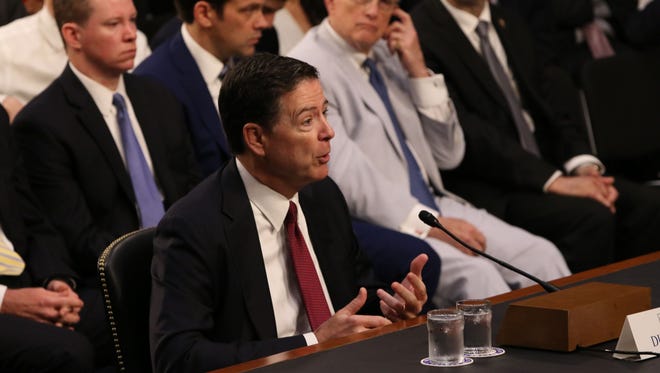James Comey testimony was a disaster for Donald Trump and his White House
Did the president try to obstruct justice? The former FBI director makes clear that's on the table.

The testimony of former FBI director James Comey today was a remarkable moment in American politics. President Trump’s supporters will lean heavily (and rightly) on the fact that that there was no direct accusation of criminal acts against the president, which might be a low bar but it is nonetheless an important one. And Comey vindicated at least one of the White House’s talking points: that the president was correct when he said he was not under direct FBI investigation.
Beyond that, however, this cannot be considered anything but a political disaster for an administration already embroiled in a major scandal of its own making.
In short, the American people were treated to the astonishing sight of a former FBI director repeatedly calling the president of the United States a liar, including twice in the very first minutes of his testimony. Comey then went farther, in effect daring the president to contradict him. When the subject of Trump’s tweet about tapes came up, for example, Comey said: “Lordy, I hope there are tapes.” When Sen. Tom Cotton, R-Ark., curtly asked Comey if he would agree to release his personal notes in exchange for the president releasing any tapes, Comey merely said, “Sure.”
Trump’s defenders, however, have a point that there is no smoking gun here in terms of a direct accusation from Comey that the president tried to obstruct justice. But Comey didn’t have to make that charge directly. He repeatedly relayed the circumstances of his meeting with Trump, including the president’s request that everyone leave the room. “Why did he kick everyone out of the Oval Office?” Comey asked. “To me, as an investigator, that is a very significant fact.” When asked why he wrote down a record of his dinner at the White House, Comey cited “the circumstances, the subject matter,” and “the nature of the person,” a remarkable thing for the nation’s top law enforcement officer to say about a discussion with the nation’s chief magistrate.
Special counsel Robert Mueller is bad news for Donald Trump — and Russia
POLICING THE USA: A look at race, justice, media
GOP senators, in a bizarre maneuver, pressed Comey for not simply quitting his job or reporting Trump for a felony. “You kept showing up to work,” Sen. Roy Blunt, R-Mo., said. This is an odd charge in itself — imagine how Comey would have been smeared for resigning after one dinner with the president — and it allowed Comey to shoot back that staying was the only way to protect ongoing investigations. Sen. John Cornyn, R-Tex., gamely noted that firing Comey changed nothing about those investigations; Comey coolly replied that this was true only because special prosecutor Robert Mueller was now on the case. (Cornyn reacted by shifting the discussions to Hillary Clinton, always a reliable Republican escape hatch.)
Other senators hammered on the fact that the president issued no direct order to drop the investigation into now-fired national security adviser Mike Flynn. Comey, in response, made clear that he knew what he was being asked. “When a President of the United States in the Oval Office says something like ‘I hope’ or ‘I suggest’ or ‘would you,’ do you take that as a directive?” Sen. Angus King, I-Maine, asked. “Yes,” Comey replied. “Yes, it rings in my ear as kind of, ‘Will no one rid me of this meddlesome priest?’,” a reference to the famous utterance of King Henry II before the murder of his enemy Thomas a Becket. This was a great moment for history buffs, but it is an awful moment in the history of American politics.
Comey showed the most passion on the subject of Russia’s interference in the 2016 American presidential election, a point Democrats will likely (and incorrectly) seize on as evidence that Trump did not win the election fairly. This partisan talking point will miss Comey’s far more important warning: Russian interference was a direct attack on our political system, and it’s not over. “They will be back,” Comey said emphatically.
James Comey's testimony doesn't make the case for impeachment or obstruction against Donald Trump
Are Trump voters ruining America for all of us?: Tom Nichols
Comey’s testimony is not even close to the end of this episode. As Comey himself noted, there were multiple matters he could not talk about in an open session. He repeatedly stressed that many of the questions raised today — including whether Trump tried to obstruct justice — will fall to Mueller, a possibility that likely chills the blood of the White House and national Republicans. In that respect, Comey left tantalizing clues. Asked why he suspected that Attorney General Jeff Sessions would have to recuse himself from any Russia matters, for example, Comey demurred, implying the answer was both classified and yet to be investigated.
The Democrats who hoped Comey would nail shut a charge of obstruction of justice were too hopeful. The Republicans who hoped Comey could be smeared and discredited were too cynical. This is the opening soliloquy in a potential tragedy that has many more characters to be heard from in subsequent acts, and none more important than another former FBI director: Robert Mueller.
Tom Nichols, a Russia expert and a professor of national security affairs at the Naval War College, is the author of the new book The Death of Expertise. The views expressed here are solely his own. Follow him on Twitter: @RadioFreeTom.
You can read diverse opinions from our Board of Contributors and other writers on the Opinion front page, on Twitter @USATOpinion and in our daily Opinion newsletter. To submit a letter, comment or column, check our submission guidelines.